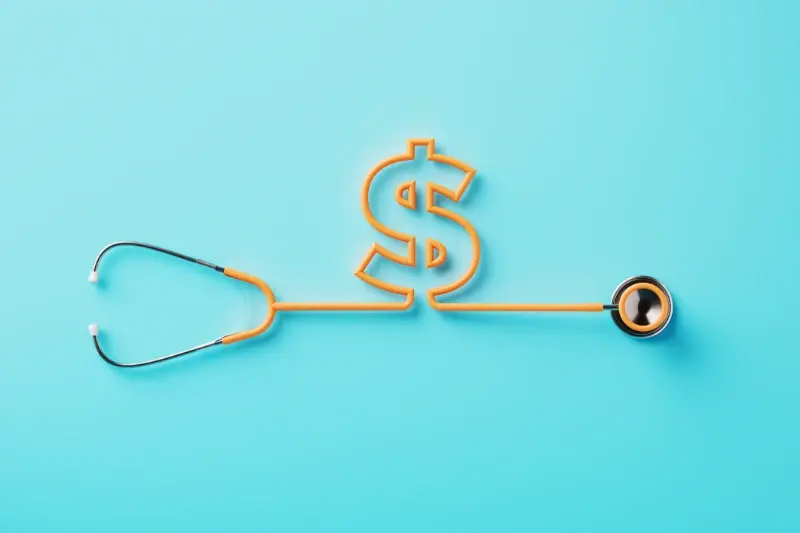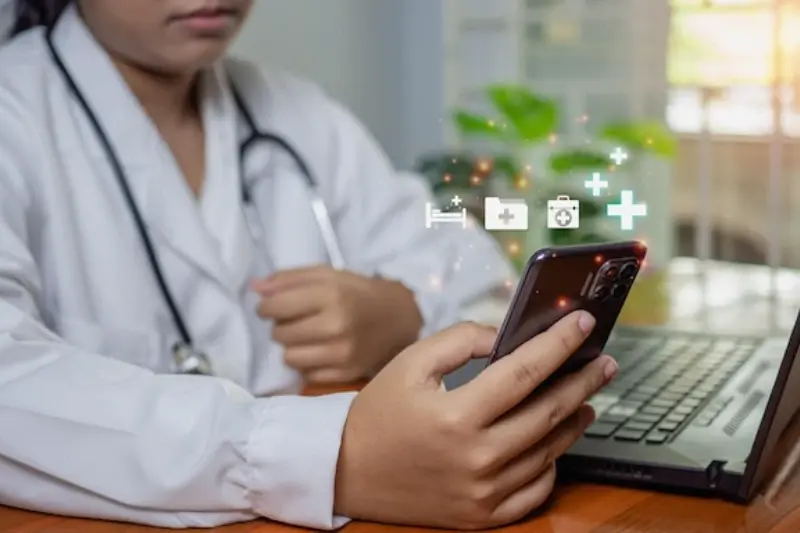Building Your First Healthcare App: A Founder's Reality Check
Building a medical app will cost you three times more than you think, take twice as long as planned, and require legal approvals you didn't even know existed. That's the reality check most founders need to hear before they start this journey. The healthcare app market is worth billions, but it's also one of the most regulated and challenging spaces to enter.
I've worked with dozens of healthcare startups over the years, and the pattern is always the same—founders come to us with brilliant ideas about solving real medical problems, but they're completely unprepared for what lies ahead. They think building a medical app is like creating any other mobile application. It's not.
The biggest mistake founders make is treating healthcare apps like consumer apps with a medical twist
This founder guide isn't here to scare you away from the medical app space—we need more innovation in healthcare. But understanding the industry reality from day one will save you months of frustration and thousands of pounds in development costs. From regulatory hurdles to privacy requirements that would make a bank nervous, building a healthcare app requires a completely different approach. Let's walk through what you actually need to know.
Understanding the Medical App Market
The medical app market is huge—and I mean properly huge. We're talking about everything from simple pill reminder apps to complex diagnostic tools that doctors use in hospitals. But here's the thing that catches most founders off guard: not all medical apps are created equal in the eyes of regulators and users.
You've got your basic wellness apps that track steps or remind you to drink water. These are relatively straightforward to build and launch. Then there are the more serious medical apps that actually diagnose conditions or help manage chronic diseases—these require much more careful planning and regulatory approval.
Market Segments Worth Knowing
Patient management apps are massive right now; think appointment booking, prescription refills, and accessing medical records. Telemedicine has exploded too, connecting patients with doctors remotely. Mental health apps are another growing sector, though they come with their own unique challenges around safety and crisis management.
What surprises many founders is how competitive this space has become. Large healthcare providers are building their own apps, and tech giants are pouring money into health initiatives. Your app needs to solve a real problem that existing solutions don't address properly—otherwise you're just adding to the noise.
Regulatory Requirements You Can't Ignore
Right, let's talk about the elephant in the room—regulations. I've worked with countless founders who think they can skip the regulatory stuff until later. Trust me, that's a recipe for disaster that'll cost you more than just money.
Medical apps face strict rules depending on what they do. If your app gives medical advice, diagnoses conditions, or connects to medical devices, you're looking at FDA approval in the US or CE marking in Europe. These aren't suggestions—they're legal requirements that can shut down your entire operation if ignored.
Key Regulatory Bodies
- FDA (Food and Drug Administration) - United States
- MHRA (Medicines and Healthcare products Regulatory Agency) - United Kingdom
- CE marking - European Union
- TGA (Therapeutic Goods Administration) - Australia
- Health Canada - Canada
The classification process determines your path forward. Class I devices have the lightest touch—think fitness trackers. Class II and III? That's where things get expensive and time-consuming. We're talking months or even years of testing, documentation, and back-and-forth with regulators.
Here's what catches most founders off guard: even wellness apps can trigger regulatory review if they make health claims. That innocent-looking symptom checker could need full medical device approval.
Start your regulatory research before you write a single line of code. The requirements will shape your entire product strategy and budget.
Building Your Healthcare Team
Here's something I learnt the hard way—you can't build a healthcare app with just any development team. I've seen founders try to cut corners by using their regular web developers or that cheap agency they found online, only to discover months later that they're missing key expertise. Healthcare apps need people who understand medical workflows, patient safety, and regulatory requirements from day one.
The Core Team You Need
Start with a clinical advisor who actually works in healthcare. Not someone's cousin who's a nurse, but a practising professional who understands your target users' daily challenges. They'll spot usability issues that could be dangerous—like a medication reminder that's too easy to dismiss or a symptom tracker that might miss red flags.
Your development team needs at least one person who's worked on healthcare projects before. They should know about HIPAA compliance, data encryption standards, and medical device regulations. It's not something you can learn from YouTube tutorials; trust me on this one.
Don't Forget Legal and Compliance
Bring in a healthcare lawyer early—not when you're ready to launch. They'll help you understand which regulations apply to your specific app and how to structure your business properly. You'll also need someone who understands medical data compliance, whether that's an in-house expert or a consultant who specialises in healthcare tech.
Privacy and Security Challenges
Here's something that'll keep you up at night—healthcare data breaches cost companies millions and destroy trust overnight. I've worked with founders who thought they could handle security themselves, only to realise they're dealing with some of the most sensitive information on the planet. Patient records, medical histories, prescription details—this isn't just any old app data we're talking about.
The regulations around healthcare data are stricter than anything you'll find in other industries. GDPR compliance is just the starting point; you'll need to understand data encryption, secure storage, and user consent frameworks that go far beyond a simple "I agree" checkbox. Every piece of patient information must be protected both in transit and at rest, which means working with developers who actually understand healthcare security protocols.
Most founders underestimate the complexity of healthcare data protection until they're already deep into development and facing a complete rebuild
What catches many people off guard is how security affects every single feature of your medical app. User authentication becomes more complex, data sharing requires multiple approval layers, and even basic functions like password recovery need special handling. You can't just bolt security onto a finished app—it needs to be built into the foundation from day one, which is why choosing the right development partner matters so much.
User Experience in Medical Apps
Here's something I've learnt after building dozens of healthcare apps—if your users can't figure out how to use your app within seconds, they'll delete it. That's true for any app, but with medical apps the stakes are much higher. We're not just talking about a poor review; we're talking about someone's health.
Medical apps need to work for everyone. Your 75-year-old grandmother with arthritis should be able to book an appointment just as easily as a tech-savvy 25-year-old. This means big buttons, clear text, and simple navigation. I always tell my team to design for the worst-case scenario—poor lighting, shaky hands, and high stress levels.
Design Principles That Actually Work
- Use large, easy-to-tap buttons (minimum 44 pixels)
- Keep text simple and avoid medical jargon
- Provide clear visual feedback for all actions
- Make error messages helpful, not scary
- Test with real users, not just your development team
One mistake I see repeatedly is overcomplicating the interface. Just because your app can do twenty different things doesn't mean all twenty should be visible on the home screen. Start with the most common user journey and make that absolutely bulletproof before adding extra features.
Testing and Validation Process
Here's where things get serious—and expensive. Testing a medical app isn't like testing your average photo-sharing app where a bug might just annoy users. Get something wrong in healthcare and you're dealing with real consequences that affect real people's health. I've seen founders underestimate this part of the process more than any other, and it always comes back to bite them.
The testing phase for medical apps involves multiple layers that regular consumer apps simply don't need. You'll be running clinical validation studies, usability testing with actual healthcare professionals, and compliance testing to make sure you meet all those regulatory requirements we talked about earlier. Each type of testing serves a different purpose, but they all work together to prove your app is safe and effective.
Types of Testing Required
- Clinical validation testing with real patients and healthcare providers
- Security penetration testing to identify vulnerabilities
- Usability testing in clinical environments
- Performance testing under high-stress conditions
- Regulatory compliance testing for your target markets
The reality check? This process can take months and cost tens of thousands of pounds. But there's no shortcut here—regulatory bodies expect thorough documentation of every test, every result, and every fix you make along the way.
Start testing early and test often. The later you find problems, the more expensive they become to fix. Build testing into your development timeline from day one, not as an afterthought.
Conclusion
Building a healthcare app isn't like creating a simple weather app or a photo editor—the stakes are much higher and the rules are much stricter. I've seen too many founders underestimate just how complex this space can be, thinking they can wing it with a basic MVP and figure out the regulatory stuff later. That approach will cost you time, money, and possibly your entire business.
The reality is that healthcare apps require a different mindset from day one. You need to think about GDPR compliance, medical device regulations, clinical validation, and user safety before you write a single line of code. Your team needs to include people who actually understand healthcare—not just developers who've read a few articles about HIPAA.
But here's the thing: if you get it right, healthcare apps can genuinely improve people's lives. I've worked on apps that help diabetics manage their condition better, connect patients with specialists, and even save lives through early detection systems. The impact potential is enormous.
My advice? Start small, focus on one specific problem, and build your regulatory knowledge alongside your technical skills. Don't try to revolutionise healthcare overnight—build something that works, works safely, and works legally. The rest will follow.
Share this
Subscribe To Our Blog
You May Also Like
These Related Stories

The Hidden Costs of Healthcare App Development Nobody Talks About

How to Navigate Healthcare App Regulation Without Delays





